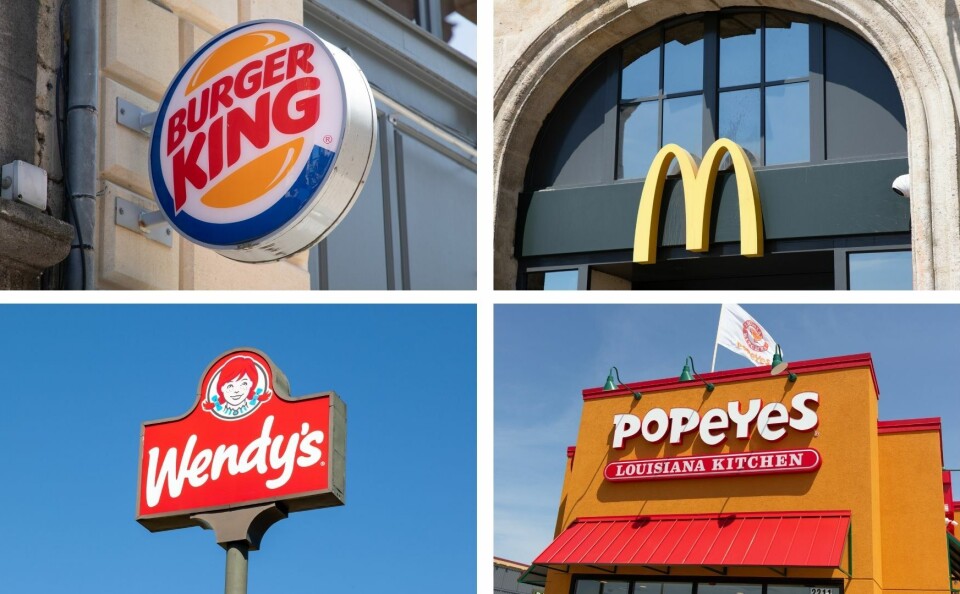-
Hospital fees set to increase in France: how will patients be affected?
Plans to save €400 million from social security spending targets several flat fees
-
New pink number plates in France lead to more police road checks
The plates are designed to enhance visibility and deter fraud
-
Alder pollen spike leads to warnings across most of France
Parts of the south-west at highest risk. Cypress pollen is also present along French Riviera
Popeyes, Wendy's, McDo: why fastfood restaurants are booming in France
Fast-food outlets from more and more companies are growing in France.

Fast-food outlets growth was accelerated by the pandemic but is being fed by a historically strong demand from the population despite an already saturated and highly competitive market.
A colossal 52,500 fast-food ‘joints’ were recorded in 2023, up from 44,000 in late 2019 and 13,000 over 20 years ago. The industry registered €23.4 billion in turnover in 2023, up 19% from 2019, according to figures from CHD Expert-Datassential, a French data study company.
McDonald’s leads the market with more than 1,515 restaurants in 2021 followed by Groupe Bernard, which owns fast-foods Burger King and Quick among others. The fast-food sector also includes businesses selling tacos, wraps, sushis, and kebabs.
The latest newcomer in the market is Popeyes, an American Louisiana-style fried chicken fast-food chain, that opened its first location in Paris on February 1.
Read more: Cheap and cheerful French restaurants are back in fashion
The number could spiral even higher as Wendy’s announced it would enter France’s market in 2023 while Quick, a Belgian chain that was bought by Burger King, also announced it was reopening.
“France is nicknamed ‘the other hamburger country’,” said Didier Pourquery, editor-in-chief of newspaper The Conversation (France) and author of Une histoire de hamburger-frites (Robert Laffont, 2019), an exploration of the love affair between French people and fast-food.
Pourquery built his book on Mythologies (Seuil, 1957) in which philosopher Roland Barthes centred one of his 53 short stories on ‘steak-frites’.
Key statistics
On average, one in every ten businesses in many towns is a fast-food outlet according to several studies, with towns such as Amiens (Somme) and Cergy-Pontoise (Val-d’Oise) trailblazing the trend with 15%.
Behind the success lie several core reasons to the acceleration that happened after the pandemic ended. For one, delivery services skyrocketed – a feature characteristic of the industry that grew following the lifting of lockdowns.
This was most exemplified on April 20, 2020, when McDonald’s reopened its Drive-service and where cars queued for kilometres in Moissy-Cramayel (Seine-et-Marne).
Almost 50% of French people said they ate at McDonald’s at least once during the last six months of 2020, while a third mentioned Burger King, and a quarter Buffalo Grill – another popular French steakhouse – according to a study from data-analysis company Statista.
French mairie officials are often likely to reduce the paperwork for those willing to open a fast-food business, which means accessible jobs and fresh vitality in town centres. “These are often meeting points for our youth in areas where bistros have disappeared,” said Mr Pourquery.
Read more: McDonald's to grade its burgers in France with health A-E Nutri-Score
Fast-food owners, for their part, have introduced new menus to adapt to changing consumer eating trends in what is known as a ‘glocalization’ marketing policy.
Glocalization – a neologism combining globalisation and location – is the adaptation of a product to an area that ties in cultural habits, most exemplified in France with McDonald’s and its infamous McBaguette. Menu diversity also includes vegetarian menus, for instance, or more salad choices.
The demand is there
However, this new trend in taking hold in a country with an existing strong culture for fast food. While Wimpy, France’s first fast-food chain in 1961, and McDonald’s, with its first restaurant in Créteil (Val-de-Marne) in 1972, did not meet expectations, things really took off in 1979 after McDonald’s returned.
The food-chain giant licensed its Créteil outlet to a French entrepreneur, who turned it into a profitable business, propelling the company’s return, said Mr Pourquery.
“McDonald’s officials thought France was the country of gastronomy and good food,” he said, “but there has always been a strong demand.”
Mr Pourquery mentioned another marketing technique from fast-food chains Quick and McDonald’s in the 90s that allowed children to celebrate their birthdays in their restaurants.
The market has now diversified with various competitors. Le Camion qui fume and Big Fernand conquered a segment of the population of late-graduate/early-working urban people aged from 25 to 45, also known as ‘hipsters.’
“Maybe they celebrated birthdays at Quick when they were children,” added Mr Pourquery.
Related links
Obesity in France must be made national priority, say health groups
Fast food in France: Bordeaux and McDonald's top list
France as a fast food nation
























